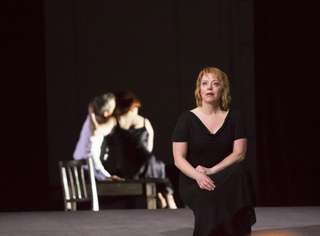|
Back
Balancing Act Houston
Brown Theater, Wortham Theater Center
04/18/2013 - and April 21, 24, 27, May 2, 5, 2013
Richard Wagner: Tristan und Isolde
Scott Quinn (Sailor), Nina Stemme (Isolde), Claudia Mahnke (Brangäne), Ryan McKinny (Kurwenal), Ben Heppner (Tristan), Kevin Ray (Melot), Christof Fischesser (King Marke), Jon Kolbet (Shepherd), Mark Diamond (Steersman)
Houston Grand Opera Orchestra and Chorus, Patrick Summers (conductor)
Christof Loy (Director), Johannes Leiacker (Set and Costume Designer), Olaf Winter (Lighting Designer)

N. Stemme (© Felix Sanchez)
Houston Grand Opera's commitment to major German repertoire has produced stunning moments on the stage in recent seasons. Tristan und Isolde stood to be a test of the company's mettle, and the company itself passed that test with flying colors. Sadly, the conducting, orchestral playing and singing were counterbalanced by a lackluster visual production and an unfortunate rendition of one of the title roles.
Tristan und Isolde, that epitome of all things unrequited, was on the HGO stage visually straightforward, almost to the point of being banal. In the Playbill, HGO Managing Director Perryn Leech writes that Tristan is a piece that is "much less defined as to period, setting and practical needs," but a glance at the first pages of Wagner's score seems to contradict Leech's description. The composer indicates, in part: "Tent-like cabin on the fore-deck of a sea-going ship, richly hung with tapestries…Isolde on a couch, her face hidden in the cushions..." That is well-defined, but none of these or similar indications from Wagner's pen seemed to matter to the production team. Indeed, Johannes Leiacker's set design is completely fungible, able to hold any opera's action. There simply was no point of view. Luckily, the other aspects of the production made up for this disappointment.
The casting, with one notable exception, was excellent. Nina Stemme was superb as Isolde, easily negotiating the challenging lines, carrying brilliantly over even the fullest orchestral textures, and masterfully portraying the contrasting emotional states in the opera's three acts. During her alone time with Tristan in the second act, Wagner smartly lifts Isolde's tessitura, and Stemme's voice floated with ease while retaining its tremendous carrying power. In their many duets, Claudia Mahnke's Brangäne was an excellent match for Stemme. She, too, possesses a large but focused voice with a gorgeous tone and was deft in her conveyance of Brangäne's confounded emotional state. Christof Fischesser's wonderful, rich bass fit the role of King Marke like a glove, and he too convincingly construed the complexity of his character. The surprise of the evening was Ryan McKinny's Kurwenal. He has certainly graduated from his bit part in 2009's Lohengrin, developing a voice much better suited for Wagner than for Britten. It is a joy to see such growth in his singing and acting and to hear him in larger roles.
The major problem with the entire production, however, was Ben Heppner's Tristan. This simply is not a role he should sing anymore. Yes, there was a time that he was arguably the finest Tristan in the world, as can be witnessed on DVD from the Met under James Levine and various broadcasts from the late 1990s and early 2000s. The second act was uncomfortable to listen to. While Stemme gloriously soared through Wagner's ecstatic lines, Heppner either couldn't be heard or, if he could, his voice was often straining or he was resorting to falsetto for high notes that should ring loud and clear. While in the first act the voice was a little shaky, it wasn't enough to unnerve Mr. Heppner, but in the second act the singer himself seemed uneasy with the sounds he was making. Fortunately, Heppner redeemed himself, for the most part, in the third act, although even here he was overshadowed by McKinny and, later, Stemme.
Patrick Summers clearly enjoyed diving into this score, and drew excellent playing from his orchestra. Wind solos from principal horn and cor anglais were excellent, especially the latter's aching, extended solos in the third act. Summers paced the first act expertly. A slightly hesitant prelude led to a sustained first half and, when the love potion started coursing through the lovers' veins, he ratcheted up the tension and evoked audible "wows" from several audience members at the act's last chord. This bodes well for HGO's upcoming Ring cycle, to be spread over four seasons.
Marcus Karl Maroney
|